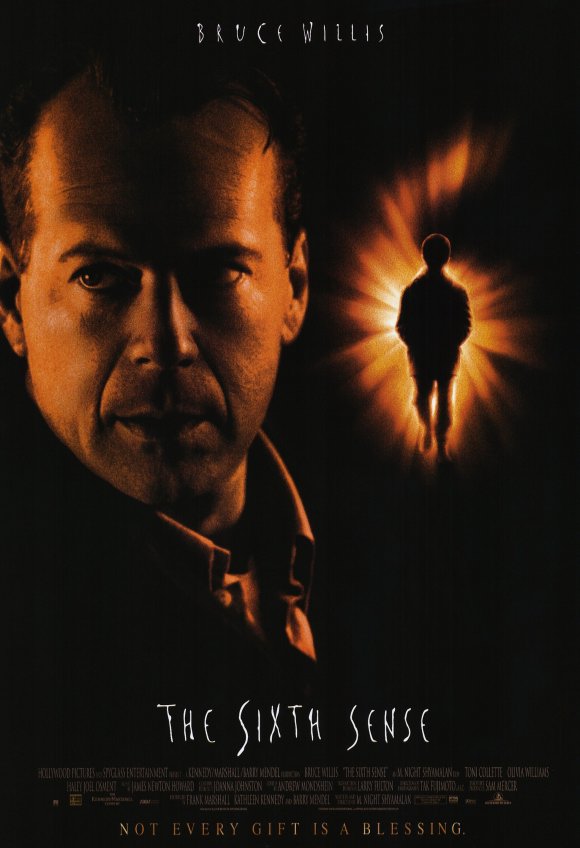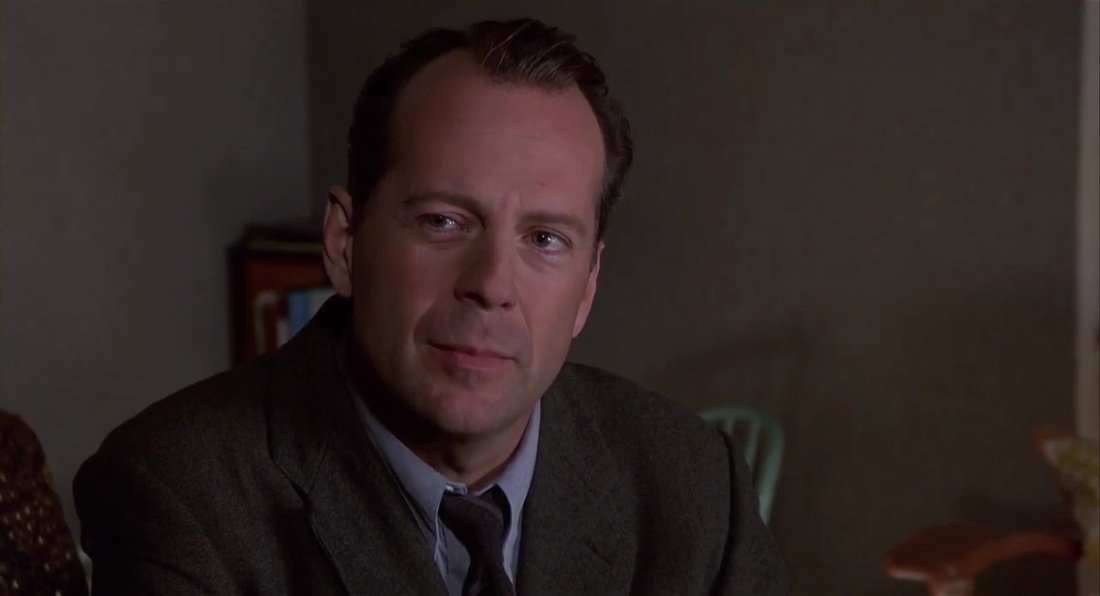"One of the rarest of movie treats, a thinking person's thriller that is genuinely haunting." (Common Sense Media, 2004), just one of the many positive opinions attached to M. Night Shyamalan's 1999 chiller masterpiece The Sixth Sense, an opinion you would be hard pressed to disagree with. Following his 1998 film Wide Awake, Shyamalan well and truly came up trumps with Bruce Willis fronted twist fest The Sixth Sense, a film that sees Willis tap into his more emotional side, that had until then, gone unnoticed as the star had pretty much stuck to championing action films such as Die Hard (1998) and The Last Boy Scout (1991).
 |
| Fig 1: The Sixth Sense, Movie Poster |
The Sixth Sense follows the story of child psychiatrist Dr. Malcom Crowe, played by the afore mentioned Bruce Willis, a successful doctor who is shot by a patient who has grown to resent Crowe. The film then skips ahead a number of months, a time that shows Dr. Crowe's marriage in a deteriorated state and the doctor working with a new patient, Cole Sear, played superbly by Haley Joel Osment. All is not well with the young Cole as he appears socially awkward and all together detached from society, issues that Dr. Crowe has faced before and can surely work his renowned psychiatrist magic on. Just as the film enters its middle act, it subtly slips into the more eerie aspect of its existence, with Cole delivering the tagline to end all taglines, "I see dead people". The film now fully embraces what the audience has been waiting for, as an explanation to Cole's odd behaviour leads Shyamalan's creation into its jump scare induced final state. After countless 'hide behind the sofa' moments and a beautiful telling of an emotional piece of writing from Shyamalan, The Sixth Sense finally ends in one of cinemas most beloved final acts, leaving audiences in a teary eyed perplexed state, earning the right to be associated with statements like "one of those revelations that make you mentally unpick everything you've seen" (Newman, 2015). After an initial viewing, The Sixth Sense feels like an accomplishment, an accomplishment that has lead to the director being given the green light to take on future projects such as Unbreakable (2000) and Signs (2002), but could the 1999 thriller be hiding an underlining message? quite possibly.
 |
| Fig 2: The Sixth Sense, Screenshot |
The entirety of The Sixth Sense is beyond enjoyable to watch, it actively grips the viewer, giving them no chance to switch off as each scene offers up a delightful combination of jump scares and vital information that gently furthers the plot. Each scene showcases both lead actors incredible abilities to not only provide genuinely heart felt dialogue, but a sense of unease in the most normal of situations, culminating in some of the most gripping and eerie moments in filmic history. Not only does each scene showcase both lead actors skill, but every moment offers up another reason for The Sixth Sense to creep and scare its way into your favourite films, as not only does each sequence offer something new to the ever developing story, it begins to force the audience into a state of doubt, wondering if this creation will ever culminate into a satisfying ending, which it most definitely does.
Whilst watching The Sixth Sense you would not be criticised for viewing it solely as a cinematic master class in writing, as Shyamalan truly does deliver a script that easily surpasses the inspirational, but it could also be said that Shyamalan was quietly trying to usher in an undertone that carried a message. Throughout the entirety of The Sixth Sense, the film deals with the idea of loss and suffering, something that is apparent in the majority of peoples lives at one point or another. Not only does this film show characters actively moving on as it were, it preaches the idea of metaphorically moving on, which could be associated with a number of experiences in a persons life. Whether Shyamlan was trying to teach this idea of letting go or not remains purely at a speculative level, however one cannot argue that this theme is more than apparent throughout The Sixth Sense, jump scaring its way from scene to scene.
 |
| Fig 3: The Sixth Sense, Screenshot |
M. Night Shyamalan's 1999 chiller masterpiece The Sixth Sense, carries a blinding script, a incredible story and mind blowing performances throughout, all aspects that have no doubt resulted in this 'twistaphon' cementing its place in cinematic history. When searching through the cinematic history books, there isn't really an existing way to bypass The Sixth Sense, as not only does the film revel in this idea of the unknown, it relishes in it, leading to others describing it as a film that "has a kind of calm, sneaky self-confidence that allows it to take us down a strange path, intriguingly." (Ebert, 1999). The Sixth Sense is a master class on a number of different levels, writing, directing, acting and most importantly, thrilling.
Bibliography
Common Sense Media, 2014, The Sixth Sense, https://www.commonsensemedia.org/movie-reviews/the-sixth-sense, Accessed on: 12/04/2016
Ebert, Roger, 1999, The Sixth Sense, http://www.rogerebert.com/reviews/the-sixth-sense-1999, Accessed on: 12/04/2016
Newman, Kim, 2014, The Sixth Sense Review, http://www.empireonline.com/movies/sixth-sense/review/, Accessed on: 12/04/2016
Illustration List
Fig1: Movie Poster, The Sixth Sense, http://www.moviepostershop.com/the-sixth-sense-movie-poster-1999, Accessed on: 12/04/2016
Fig 2: Screenshot, The Sixth Sense, https://viewerscommentary.com/2012/10/25/review-the-sixth-sense/, Accessed on: 12/04/2016
Fig 3: Screenshot, The Sixth Sense, http://www.cinemablography.org/blog/inside-look-the-story-and-cast-of-the-sixth-sense, Accessed on: 12/04/2016

Once again, thoughtful and engaging, Lewis :)
ReplyDelete